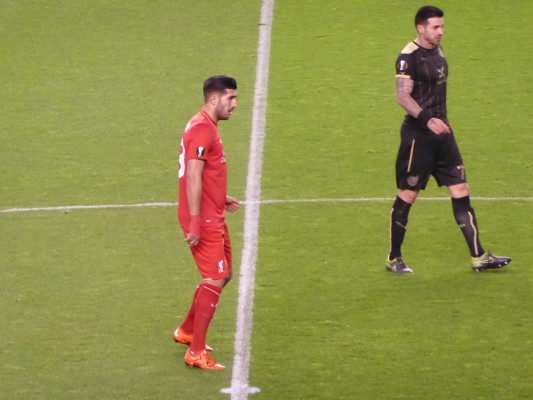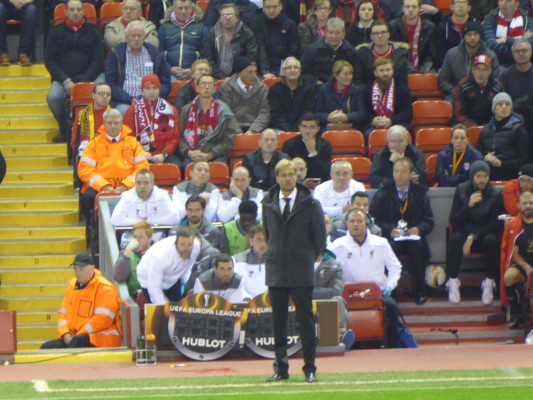I can well imagine how Twitter could have been seen as a real force for good when it was first invented. A medium that allows you to send short, incisive messages to anyone in the world and lets people communicate without editorial judgment. It was intended to bring people closer together, allowing folk to interact without having to let them pry into every aspect of your personal life in the way that Facebook does. Indeed, it has been used for good on countless occasions. From the Arab Springs through to the use of the #porteouverte hashtag on the night of the Paris attacks, Twitter has played its part in helping people more than once.
Yet it has also long been the home of the troll, the taunter, the keyboard warrior. Celebrities have had to deal with death threats; members of the public have been shamed and humiliated; political movements have used the medium to shape the outcome of elections and referendums. What I want to talk about today doesn’t have anywhere near the same insidious undercurrent as all that, but in some ways it’s just as troublesome within its own universe. “Football is the most important of the least important things in life” is a quote I often think about. We take it so seriously – it can affect my mood from one day to the next – and yet in the end it’s an irrelevance. So why does it matter if a supporter takes to Twitter to moan?
It’s Difficult To Break Bad Habits
I’ve been intrigued to see how our fan base as a whole has reacted to the way this season has panned out. I’ve long been aware that Twitter is a place where people go to express the extreme edges of their reactions – it’s difficult to express nuance in 140 characters, after all. Yet to see the swings from one set of emotions to the other has been an interesting experience. Back in September, October and November, when we were hitting four, five and six goals past teams, many supporters believed that we were on route to a title win. By the end of January you’d think that some of them genuinely believed we were at risk of relegation.

Emre Can In The Centre Circle v Rubin Kazan
So why does it matter? Who really cares if a supporter heads onto Twitter to slag off Jürgen Klopp, Daniel Sturridge or Emre Can? Will it really affect the players if someone uses 140 characters to say that Gini Wijnaldum is a ‘fraud’? Obviously the answer is ‘no’. As @KopiteLuke1892 said, we’re not going to lose because a random bloke on Twitter said we’re not very good. That’s an entirely fair and reasonable point of view that, on the surface at least, is hard to argue with. After all, Luke isn’t referring to the supporters who tweet players directly to tell them what they think of them, just people who tweet negative comments such as ‘we’ll definitely struggle today’.
People fuming about fans being pessimistic. We’re not going to lose because Ken on twitter said we are shite.
— Lüke (@KopiteLuke1892) May 13, 2017
My counter argument to Luke’s point is that complaining is a difficult habit to get out of. Of course the entire Liverpool team isn’t going play poorly because of some messages sent out by faceless fans on social media. Yet the more someone gets into the habit of moaning, complaining and being negative the harder it is to shake that off if and when they head to the stadium to watch a live match. Personally I have a season ticket for the Kop, so I’ve seen all but two home games this season and none of the away games. I watch the aways on TV when I can, as I’m sure plenty of other supporters do. If I spent every single away match slagging off the players, the manager’s tactics and our overall performance, what sort of attitude would I then take into the home games with me?

It’s easy to suggest, as some people do, that you can ‘get right behind the team’ when you take your seat in Anfield, but if you’re in the habit of complaining then what guarantee is there that you’ll do that? The atmosphere at Anfield has long been a source of complaint for supporters, with many feeling that people are quick to jump on the back of players. It’s little wonder if they’ve spent all week saying how ‘obvious’ it is that we’re going to lose when the pressure’s on. The slightest bit of poor play and plenty within the ground are happy to let others know their opinion on how Sturridge is ‘lazy’, Can’s ‘too slow’ or Origi’s ‘not good enough’. It’s not helpful for anyone and is equitable to those morons who go on football phone-ins right after a loss and say that the manager needs to be sacked.
*Please* don’t make me watch another full season of James Milner at left-back. Not sure I can cope. #LFC
— And Could He Play (@andcouldheplay7) May 14, 2017
One of the biggest problems is that most of us our guilty of it. How many of us, I wonder, went into Sunday’s game against West Ham fearing that the Reds would struggle to get a result because Arsenal had so convincingly beat Stoke the day before? How many are scared of what will happen against Middlesbrough this weekend? How often have we watched this Liverpool team underperform and taken to Twitter to express our frustrations? I can’t pretend to be innocent and perhaps those in glass houses shouldn’t throw stones. Maybe I’m just as bad as the people I don’t like. I would say that I only tweet constructive criticism but then I’m sure they’d say the same. The point is, assuming the worst doesn’t help anyone and constantly sniping and bickering about how ‘poor’ we are online will naturally pervade your mind for when you head to the ground and have the chance to make a difference.
The Facts Don’t Back Up The Moaning
Here’s something not everyone will be keen to hear: the facts of Liverpool’s season don’t line-up with the negative opinions of the moaners. Those supporters that, for some entirely inexplicable reason, love to whinge and complain about the football club they’re meant to be fans of seem to have adopted the media’s approach to reality, which is to say entirely ignoring it. Yes, there’s been a disappointing aspect to our season, there’s no getting away from that. When we were going great guns earlier in the campaign it truly did seem as though we could challenge for the title. Yet the fact that we ended up missing out on a title challenge does not mean we’ve not been good this season.
@liverpool Liverpool. You were rubbish today. Not good enough to play in the champions league. Am gutted with your performance
— Claire Thompson (@Clairefleming65) May 7, 2017
Sometimes you need to take a step back and have a look at the facts, not the narrative. Doing that will reveal some things that absolutely smash the ‘Liverpool stumbling to fourth’ narrative to pieces. How many games make up a run? How many matches need to be taken into consideration for them to be representative of form? Let’s go back to the start of March, for the sake or argument. That will mean looking at our last 11 games, which is a little over a quarter of the season. Given that our critics believe we’re having a poor conclusion to our campaign, a quarter of the season’s worth of evidence looks a decent amount of time in my opinion.
Here’s how that pans out: 7 wins, 3 draws, 1 loss. If you run that over the course of a season that would amount to around 24 wins, 11 draws and 3 losses. That’s the equivalent of an 83 point season. 83 points would be a very good return and would have seen us win us the title last season. So where has the narrative emerged from that we’re stumbling towards fourth? Obviously the answer is the teams we’ve drawn and lost against. Draws at home to Bournemouth and Southampton and a loss at Anfield to Crystal Palace are enough to frustrate, annoy and confound. Yet we’ve also beaten Arsenal in that time and secured wins over Stoke City and West Brom away from home, to say nothing of our draw with Manchester City at the Etihad.
LFC’s last 10 matches:
Won 6, drawn 3, lost 1.
Literally no joke, you’d have thought they’d won 1 in 10, given the negativity of some.
— Henry Jackson (@HenryJackson87) May 16, 2017
Those results are frustrating and to say otherwise would be misleading, but if you think they prove that we’ve ended up having a poor season then you’re guilty of a degree of confirmation bias. Let’s get this right, last year we managed 60 points. We’re 13 points better off this season with one match still to play. We have, very evidently, improved a huge amount this time around. This is only the manager’s first full season in charge of the club, so to rack up what might be a 16 point improvement on last time out and then qualify for the Champions League is not an achievement to be sniffed at.
In every year since the Champions League was extended to the top four teams in the Premier League, 73 points would have been enough to get into Europe’s premier competition. That we could end this season on 73 or 74 points and somehow miss out on the Champions League is surely a sign that this is a more competitive season than any of the others that have gone before and not that we’ve had a poor campaign? As Andrew Beasley has pointed out, we’re already on course for our sixth best points haul since the Premier League was formed over 20 years ago. Just think about that for a second; this campaign, that so many of our fans believe has been disappointing, has only been bettered on five occasions since 1992.
Barring a six goal win next weekend, this will have been Liverpool’s sixth best season in the 25 years of the PL. pic.twitter.com/xsILvNNvXS
— Andrew Beasley (@BassTunedToRed) May 14, 2017
So that, in my opinion, is the other reason that supporters on Twitter need to stop being so negative. Even if they believe that they have the ability to separate their online persona from the one that turns up at football grounds and are therefore capable of getting behind the team when it matters, their negativity on social media feeds a narrative that allows the press to falsely suggest that we’ve had a poor season. It bleeds into the idea that we might ‘bottle it’, or ‘struggle against the lesser sides’. Few managers walk into a club and immediately turn them into title contenders. You may point to Cladio Ranieri at Leicester or Antonio Conte at Chelsea, but the former was a 5000/1 shot and the latter has been in charge of one of the most expensive squads in the league.
Here’s the natural contradiction that negative fans online never quite manager to fit together: they believe that most of our players aren’t good enough but that we’ve underachieved this season. You can’t have it both ways. Moaning online might not seem like it matters, but it does. With one game left to go and Champions League the prize at the end of it all, it’s time for every single Liverpool fan to get behind the team and roar them on to victory.



